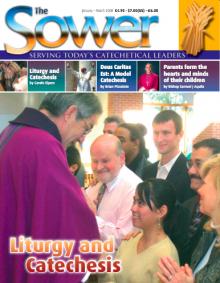A little exegesis on the recent Letter to Catechists from the new Prefect of the Congregation for the Clergy reveals an intention to lead us to find spiritual riches and strength from the Church’s living Tradition. The Letter is simple, deeply moving, and always encouraging in its tone. Its keynotes are joy, trust, gratitude and the need for perseverance and even heroic sacrifice.
Let us look at three of the key concepts which are repeated through the Letter. It is worthwhile reading through the Letter with these words and phrases in our mind.
Trust
Trust is a gracious, careful term that places everything ultimately under the providence of God, for whom nothing is impossible. Cardinal Hummes asks us to cultivate ‘with trust’ a relationship with the Lord. We need to develop this essential quality since only with this can we be ‘trusted’ with what the Lord wishes us to receive. The term speaks to us, then, of the preciousness of our vocation. It is important to note that this same term is used to describe both our relationship with the Lord and our relationship with those whom we are catechising - the Cardinal writes of catechumens being ‘entrusted’ to us, by God and by the Church. This is the ‘daily faithfulness to God and man’ of which he speaks, just as the Catechesi Tradendae and the General Directory for Catechesis invite us to this double fidelity ‘in a single, loving attitude’, to the fullness of the Truth we hand on, and also to the full understanding of the human person in all of his concrete reality (CT 55; GDC 145).
Cardinal Hummes also reminds us that catechesis is ‘entrusted’ to his Congregation, the Congregation for the Clergy. This is because catechesis is entrusted by Christ in his Church, above all, to the clergy. Catechesis is primarily the responsibility of the bishops, the successors of those who first heard the words of Christ to go, preach, baptize and teach. The bishops share this responsibility with their priests since, by the sacrament of Holy Orders priests become ‘educators of the faith’ (see GDC 224). All catechesis undertaken by religious and laity is a collaboration in the teaching office of the Church. Catechesis is given on ‘trust’.
Service
A second theme of the Letter is service. The Cardinal begins by speaking of his own role as a service to the Holy Father, and then goes on to thank catechists for their own ‘untiring ecclesial service’. He is echoing here the General Directory for Catechesis which tells us that ‘the ministry of catechesis appears, then, as a fundamental ecclesial service for the realisation of the missionary mandate of Jesus’ (GDC 59). We are being asked to appreciate how essential is the rootedness of the catechist in the Church. The term ‘service’ appears twice more in the Letter: we are encouraged to ‘nourish our service’ with the ‘food of the strong’, the Eucharist, and we are invited to reveal the face of Christ ‘through the grace and faithfulness of our service’.
Strength
The theme of strengthening is also a prominent one. St Paul’s language of the ‘good fight of faith’ is linked to the need to ‘strengthen your faith’ for the sake of providing an account of the faith to others. We have seen that the Eucharist is described as the ‘food of the strong’ and the other means of strengthening faith are identified by the Cardinal as being prayer, continuing education and charity. The mind, the heart and the spirit must all be strengthened for the work of catechesis, since catechesis will require catechists to ‘risk their lives’ for the sake of the proclamation of the Gospel and the establishing of the Church. The Cardinal also makes clear that the strength of the catechist is derived only from ‘attentiveness and silence with the Lord’, only from a surrender to the Lord which allows all glory to be given to Him. Our lives, as well as our teaching, are to be Christocentric – living testimonies that ‘the Lord is victorious over sin and death’ (cf GDC 98).
Finally, we might want to note one other telling point in this Letter. It was given on the Feast of St Luke, and the Cardinal wishes especially to recall St Luke’s ‘foundational contribution to the universal proclamation of Jesus Christ dead and risen, and of his kingdom’. That Luke’s Gospel is indeed foundational in a number of ways for catechesis can be illuminated by the use of this Gospel in the Catechism of the Catholic Church. In the Catechism we find a particular attention given to two passages from this Gospel, the Annunciation and the Road to Emmaus. The first passage is indeed foundational for our understanding of the way in which the Word takes root in human nature, and it is no accident that the Letter closes with an invocation to the Blessed Virgin.
The story of the disciples on the road to Emmaus, uniquely from St Luke’s Gospel, is a resurrection story describing the disciples’ path from dejection to joy. This short Letter speaks several times of such joy, the joy of ‘ministers of the Gospel whose lives glow with fervour who have first received the joy of Christ’. We pray for this new Prefect of the Congregation for the Clergy that he be sustained as he continues to support us in our ecclesial service.
This article is originally found on page 4 of the printed edition.
This article is from The Sower and may be copied for catechetical purposes only. It may not be reprinted in another published work without the permission of Maryvale Institute. Contact [email protected]

















